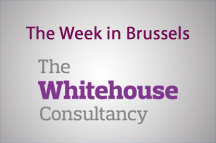 As the migration crisis continues, EU leaders met this week to discuss a plan supported by Germany to give Turkey money and a closer relationship with the EU in exchange for more assistance in holding back refugees crossing the Aegean each day. The deal has drawn criticism from left and right, with some focusing on President Erdogan’s authoritarian rule and others on Turkey’s demand for less strict visa restrictions to Europe for its citizens. Angela Merkel, herself a strong supporter of the plan, might have to scale back the concessions to Turkey, given the recent losses her party suffered in regional elections in Germany.
As the migration crisis continues, EU leaders met this week to discuss a plan supported by Germany to give Turkey money and a closer relationship with the EU in exchange for more assistance in holding back refugees crossing the Aegean each day. The deal has drawn criticism from left and right, with some focusing on President Erdogan’s authoritarian rule and others on Turkey’s demand for less strict visa restrictions to Europe for its citizens. Angela Merkel, herself a strong supporter of the plan, might have to scale back the concessions to Turkey, given the recent losses her party suffered in regional elections in Germany.
In addition to visa liberalisation, the deal so far includes €3 billion in funding for Turkey to manage the crisis (Turkey demands a further €3 billion on top of this, as well as easier access to funding), the opening up of new enlargement chapters, which have been frozen for years and a resettlement / readmission process, whereby for every refugee sent back to Turkey, the EU would accept another refugee staying in Turkish territory.
The plan has also given the impression of Europe playing to Turkey’s demands, with the country strengthening its position against a continent that seems incapable of acting effectively to address the refugee crisis. It is indeed difficult even for the most ardent supporters of the European project to defend these choices. An agreement might be reached today.
In the meantime, the so-called Western Balkan route remains closed, with refugees living in limbo in the Greek village of Idomeni, near the country’s northern border. The camp was visited this week by none other than Angelina Jolie, who also met with Prime Minister Tsipras, prompting the Greek Internet to go crazy with memes (one example accessible to those not up to speed with their Greek here).
A “strong partnership for job creation and inclusive growth”
This week also saw the Tripartite Social Summit, a forum for dialogue between the EU institutions at president level and the European social partners at top management level. Participants include the President of the European Council, the President of the European Commission and the Head of State or Government of the rotating presidency (currently the Netherlands), as well as employer and trade union representatives from European-level associations.
European Council President Donald Tusk chose to focus his remarks on the refugee crisis, stressing the importance of the successful integration of refugees into the labour market as “the only way to enable the newcomers to stand on their own feet” and “the only way to turn the current wave of migration into an economic opportunity”.
Although the EU is far from finding a solution to the refugee crisis, expect the topic of integration to feature heavily in future discussions. It is no coincidence that the European Parliament is already drafting a report on the integration of refugees into the labour market. Employment and economic self-sufficiency are viewed as key elements in ensuring a smooth integration of refugees in European societies, not to mention as possible tools in tackling radicalisation.












